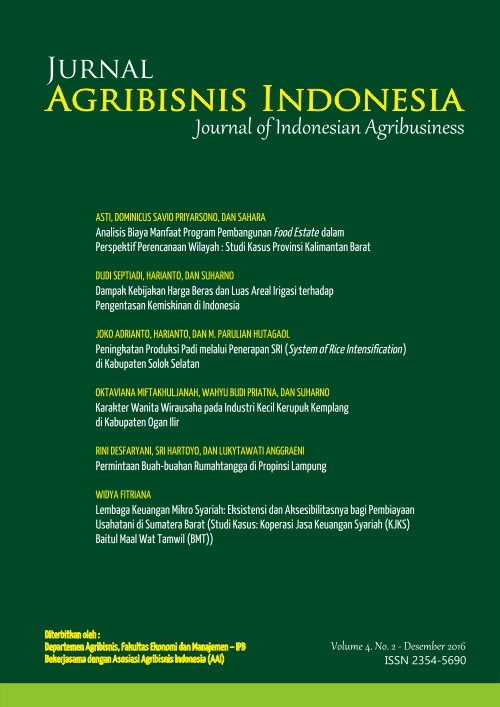LEMBAGA KEUANGAN MIKRO SYARIAH: EKSISTENSI DAN AKSESIBILITASNYA BAGI PEMBIAYAAN USAHATANI DI SUMATERA BARAT (Studi Kasus: Koperasi Jasa Keuangan Syariah (KJKS) Baitul Maal Wat Tamwil (BMT))
Main Article Content
Abstract
Downloads
Article Details
Jurnal Agribisnis Indonesia (JAI) is an Open Access Journal. The authors who publish the manuscript in this journal agree to the following terms:
Creative Commons License
JAI is licensed under a Creative Commons Attribution 4.0 International License. This permits anyone to copy, redistribute, remix, transmit, and adapt the work provided the original work and source are appropriately cited.
This means:
(1) Under the CC-BY license, authors retain ownership of the copyright for their article, but authors grant others permission to use the content of publications in Jurnal Agribisnis Indonesia in whole or in part provided that the original work is properly cited. Users (redistributors) of JAI are required to cite the original source, including the author's name, JAI as the initial source of publication, year of publication, volume number, issue, and Digital Object Identifier (DOI); (2) Authors grant JAI the right of first publication. Although authors remain the copyright owner.
References
Dzadze, P,. Osei, M., Aidoo, R., Nurah., (2012). Factors determining access to formal credit in Ghana: A case study of smallholder farmers in the Abura-Asebu Kwamankese district of central region of Ghana. Journal of Development and Agricultural Economics Vol. 4(14), pp. 416-423, December 2012
Husein H (2007). Farm Household Economic Behaviour in ImperfectFinancial Markets. Uppsala : Swedish University of Agricultural Sciences, Doctorial Thesis. Accessed from http://pub.epsilon.slu.se/1563/1/HHKfin0.pdf on March 20, 2011.
Isminiyati. (2004). Eksistensi BMT (baitul maal wat tamwil) sebagai lembaga keuangan syariah di Indonesia. Jurnal Hukum Pro Justitia. Nomor 4 Oktober 2004 Halaman 71 – 84
Kostov, P., Arun, T., Annim, S. (2015). Access to financial services: The case of the ‘Mzansi’ account in South Africa. Review of Development Finance 5 (2015) 34–42
Nikaido, Y., Jesim, P., Mandira, S. (2015) What hinders and what enhances small enterprises’ access to formal credit in India? Review on Development Finance 5 (2015) 43-52
Nouman M, Siddiqi MF, Asim SM, Hussain Z (2013). Impact of Socioeconomic Characteristics of Farmers on Access to Agricultural Credit. Sarhad Journal Agric. 29(3):469-476
Nikaido, Y., Pais, J., Sarma, M., (2015). What hinders and what enhances small enterprises’ access to formal credit in India?. Review of Development Finance 5 (2015) 43-52
Owuor G (2009). Can Group Based Credit Uphold Smallholder Farmers Productivity and Reduce Poverty in Africa? Empirical Evidence from Kenya. Canterbury : EAAE-IAAE Seminar, University of Kent
Paxton J, Graham D, Thraen C (2000). Modeling Group Loan Repayment Behaviour: New Insights from Burkina Faso. Econ. Dev. Cultural Change 48(3):639-655
Payne. S,. Mc Creaddie M.. (2010) Evolving Grounded Theory Methodology : Toward a Discursive Approach. Int J nurs Stud. 2010 Jun; 47 (6): 781-93 doi:10.1016/j.ijnurstu.2009.11.006.Epub 2009 des/4
Rachmad Handayana, Sjahrul Bustaman, (2007). Fenomena Lembaga Keuangan Mikro Dalam Perspektif Pembangunan Ekonomi Pedesaan. Balai Besar Pengkajian dan Pengembangan Tekhnologi Pertanian. Bogor.
Sudaryanto, T. dan M. Syukur. (2000). Pengembangan Lembaga Keuangan Alternatif Mendukung Pembanguna Ekonomi Pedesaan. Mimeo. Puslitbang Sosek Pertanian, Badan Litbang Pertanian.
Yunus, M. (1981). Credit for Self-Employment: A. Fundamental Human Right. Grameen Bank, Bangladesh.
Yehuala, S. (2008). Determinants of smallholder farmers' access to formal credit: the case of Metema Woreda, North Gondar, Ethiopia. North Gondar: MSc. Thesis: Haramaya University

